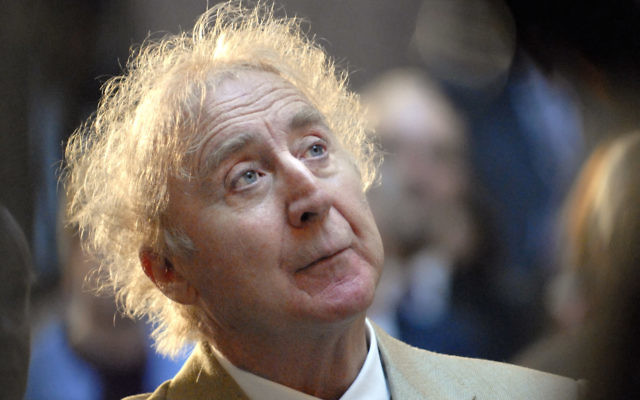‘I dated the late, great Gene Wilder’
“What a wonderful, wonderful man Gene Wilder was,” muses Elaine Berkowitz. “He was a genuinely beautiful human being, as well as being a truly marvellous actor.”
“WHAT a wonderful, wonderful man Gene Wilder was,” muses Elaine Berkowitz. “He was a genuinely beautiful human being, as well as being a truly marvellous actor.”
The Jewish star who passed away last Sunday first attracted the attention of former Hollywood Reporter journalist Elaine Berkowitz after starring in Western comedy The Frisco Kid.
Working for the newspaper in Los Angeles, Berkowitz was used to rubbing shoulders with the rich and famous. But for her, no celebrity was as special or as down-to-earth as Gene Wilder.
“I was in my apartment making some toast when Gene rang me up to ask me out for our first date,” Berkowitz exclusively told The AJN. “At that exact moment, my whole apartment filled with smoke. At that time, for some reason, I had no idea what a smoke alarm was or what was happening.
“He stayed on the phone with me, and talked me through it and gave me instructions on how to fix it. I just remember thinking what a nice man he was to do that for me.”
Soon after, Wilder and Berkowitz went on their first date and “hit it off instantly”.
“I can remember it as if it were yesterday,” Berkowitz recalls. “He was so genuine. He didn’t try to play the fool or act comedic to impress me. He was just a nice man.”
Berkowitz also shares an anecdote from another one of their dates, when Wilder took her out on a chilly night to an outdoor Japanese restaurant near his home in Bel Air.
“They had overhead radiators in the courtyard,” Berkowitz remembers. “And the couple at the next table were having terrible trouble with their heater. The woman was shivering and the man was taking off his coat to give to her.
“Gene looked over at them, and then took his chair over to their table, climbed up on it and started tinkering with the radiator. I remember him as being a bit of a handyman. Eventually he fixed it and they were so grateful. I don’t even think they recognised him.
“But for a movie star to do that, it was quite something. To show that sort of love for strangers, to stand on a chair in the middle of a restaurant and put himself out like that just to help someone else – that gave me an incredible insight into his nature.”
The two, though, were not to marry.
In 1983, Wilder flew to New York to film The Lady in Red, which he co-wrote, directed and starred in. It was there he started dating America’s comedic sweetheart, Gilda Radner, whom he married in 1984. The pair were dubbed “America’s original comedy power couple”.
Wilder’s first Oscar nomination came from his role as Leo Bloom in Mel Brooks’ screwball comedy The Producers, followed by his memorable role as Willy Wonka in Mel Stuart’s Willy Wonka & the Chocolate Factory in 1971.
Wilder took the role on the condition that when he made his first entrance, his character would “come out of the door carrying a cane, and then walk towards the crowd with a limp … I start to fall forward, and just before I hit the ground, I do a beautiful forward somersault and bounce back up, to great applause.”
When Stuart asked why, Wilder said, “Because from that time on, no-one will know if I’m lying or telling the truth.” And thus, Wilder’s Willy Wonka was born, a role which garnered him a Golden Globe nomination.
Other memorable roles included Blazing Saddles, Young Frankenstein, Stir Crazy and Everything You Always Wanted to Know About Sex* (*But Were Afraid to Ask).
Radner, best remembered as an original cast member of Saturday Night Live, died of ovarian cancer in 1989, the same year that Wilder was diagnosed with non-Hodgkin’s lymphoma. A devastated Wilder co-founded a network to support cancer patients and their families called Gilda’s Club, and appeared in his final film Another You in 1991.
In 1991, he married Karen Webb, a speech therapist, and the couple was together until Wilder’s death last Sunday.
He died of complications from Alzheimer’s disease, although few people knew that he was sick.
Wilder’s nephew Jordan Walker-Pearlman said after his death that “the decision to wait until this time to disclose his condition wasn’t vanity, but more so that the countless young children that would smile or call out to him ‘there’s Willy Wonka’ would not have to be then exposed to an adult referencing illness or trouble and causing delight to travel to worry, disappointment or confusion”.
“He simply couldn’t bear the idea of one less smile in the world.”
YAEL BRENDER


comments